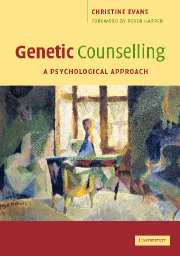Book contents
- Frontmatter
- Contents
- Acknowledgements
- Foreword
- Preface
- 1 An overview of genetic counselling
- 2 The psychological processes underlying genetic counselling
- 3 Understanding individual difference in genetic counselling using attachment theory
- 4 The role and skills of the counsellor and ideas from psychotherapy
- 5 Examples of the role and skills of the counsellor
- 6 The gene and the family system
- 7 Working with parents and children
- 8 The influence of the nature of the disorder on the consultation
- 9 The effect on the counsellor
- 10 The interview and non-directiveness
- References
- Index
4 - The role and skills of the counsellor and ideas from psychotherapy
Published online by Cambridge University Press: 12 August 2009
- Frontmatter
- Contents
- Acknowledgements
- Foreword
- Preface
- 1 An overview of genetic counselling
- 2 The psychological processes underlying genetic counselling
- 3 Understanding individual difference in genetic counselling using attachment theory
- 4 The role and skills of the counsellor and ideas from psychotherapy
- 5 Examples of the role and skills of the counsellor
- 6 The gene and the family system
- 7 Working with parents and children
- 8 The influence of the nature of the disorder on the consultation
- 9 The effect on the counsellor
- 10 The interview and non-directiveness
- References
- Index
Summary
The role of the counsellor
In the genetic counselling world there is debate about the main role of the counsellor, some viewing it as providing information (Antley, 1979), whilst others emphasise the facilitation of decision-making (Hsai, 1979). Shiloh (1996) comments that in reality, willingly or not, most counsellors become decision-making counsellors. Soldan et al. (2000) are of a similar mindset and consider that in predictive testing the main aims of the interview are to assist in decision-making and to help in the preparation for a result. They differentiate between the role sometimes demanded by the system of assessing the suitability for testing and the patient-focused role of assisting in their decision-making. Horowitz et al. (2001) consider that there are two major tasks in genetic counselling: ‘shock mastery’, with the appraisal of the meaning of a test result and a review of the question, ‘Why me?’ The counsellor's role would be to facilitate the two tasks.
At first sight, the two roles of information-giver and facilitator appear to be at odds with one another. However in practice, the tension between the two roles and their different elements is not that great. The two elements may involve separate themes and processes but they are intimately linked and there is a natural follow-on process from the one to the other. The patient is given information and its meaning triggers an emotional response. If the counsellor is in tune with the patient the counsellor responsively changes from an information-giver to a facilitator.
- Type
- Chapter
- Information
- Genetic CounsellingA Psychological Approach, pp. 61 - 82Publisher: Cambridge University PressPrint publication year: 2006

